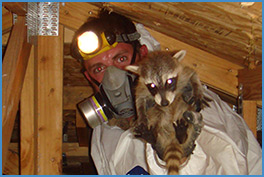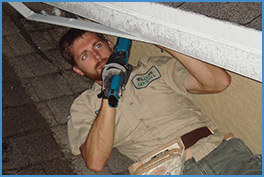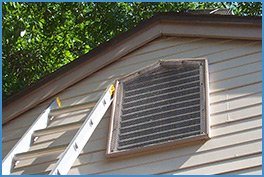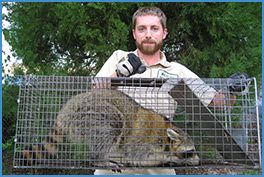Services - Wildlife Control
Select any of the below services to learn more:
Critter Trapping - General wildlife removal and relocation, performed with humane live cage traps. Wildlife removal is an art, and very easy to get wrong, to the detriment of both homeowner and animal. (click to learn more)
Building Repairs - An essential part of the process, if you have critters in your home or attic. We find the entry holes they use to get in, and seal them shut permanently, with professional repairs. (click to learn more)
Wildlife Prevention - We install deterrents to keep animals at bay. From sealing open holes in your roof, to installing bird spikes to prevent pigeons, to ground-based fences and screening, we do it all. (click to learn more)
Home Inspections - We inspect every part of your home, both inside and out, to identify the animal species, damage, and areas of entry. A full inspection inside the attic and roof is crucial if animals are inside. (click to learn more)
Attic Cleanup - In the event of critters in the attic, we remove all feces and nesting material, and decontaminate the attic. In more severe cases of damage, we offer full insulation removal and replacement. (click to learn more)
Odor Control - Whether from animal feces, dead animals, skunks, or more, we can eliminate the odor problems associated with wild animals. This can involve feces cleanup, spraying, fogging, ozone treatments, and more. (click to learn more)
Dead Animal Removal - We specialize in the removal of dead animal carcasses both inside the home and on the property. We find and remove the dead animals in your house, no matter what we have to cut through. (click to learn more)
Wildlife Emergencies - A bat flying in your bedroom, a raccoon that came in through the pet door, a snake in the swimming pool, we are available 24/7 to assist you with any wildlife emergency you might have. (click to learn more)
When you’re on the hunt for professional wildlife removal, there are two main types of commercial avenues that pop up: pest control and wildlife removal companies. More often than not, you’re going to come across advertisements for pest control first, and this can be a problem if the animal in question is larger than a bed bug.
Pest Control Companies: Pest control companies are usually synonymous with exterminators. These are companies that focus on lethal animal control methods, and the vast majority of them use chemicals (poisons) to get the job done. While that doesn’t sound like a bad thing to most people, there are a number of reasons why you should rethink this option when it comes to larger nuisance animals.
First, poison is a terrible way for any animal to die. Poisons most commonly used for pest control contain coumalin/bromadialone, powerful anticoagulants. These agents work by preventing the body from recycling vitamin K, a vitamin essential to blood clotting. Every animal experiences natural hemorrhages on a daily basis around high-stress areas of the body, and over time, without the presence of vitamin K, those hemorrhages will cause the animal to bleed to death internally. We know from human accounts of accidental bromadialone ingestion, that this process can be extremely painful.
Second, many poisons used in extermination are intended for the control of insects, and for these creatures, poisons are quick and effective. While there are poisons on the market for larger animals, like mice and rats, any company offering to poison larger animals should be looked at with some skepticism.
Finally, poisoning animals in your home is counterintuitive. As appealing as it is to have what seems like a “hands free” option, poison can cost you more in the long run. Think about it this way: you’ve managed to successfully poison the rats in your building. Where are those rats going to go to die? They aren’t going to leave your area, no matter what the urban myths say about them leaving in a grand quest for water. No, sick animals, like sick people, want to be in the places where they feel the most secure. For a rat or a mouse, this means seeking the warm, dark places of your home. Now, these animals will die and start to decay, and you’re going to be left with the problem of having to play detective with the bodies. Remember, the only way to get rid of a dead animal smell is to find and remove the dead animal.
Exterminators: Exterminators are often synonymous with pest control companies, but these agencies can be even more limited in what they offer to clients. Exterminators are primarily used to deal with insect issues within a home. These professionals utilize different chemicals and poisons to eradicate insect infestations. While they may offer services for a few larger animals, like rodents, exterminators tend to deal with the creepy crawlies that can’t be managed through any trapping and removal process. Like pest control companies, and extermination outfit that offers poison for larger, non-insect animals, should be avoided because of the points mentioned above.
Wildlife removal specialists: Wildlife removal specialists are professionals who focus on correct, humane removal of nuisance animals that don’t fall into the insect category. An experienced wildlife removal specialist can offer you options for everything from mice and rats to snakes, bats, and seagulls. More importantly, wildlife removal specialists tend to avoid poison, though there are very rare cases where it may be the only option. It should be stated, however, that just because wildlife removal specialists don’t reach right for poison doesn’t mean they don’t use lethal means to get the job done. For some creatures, like rats and mice, lethal control options are the most effective means of removal. The difference between a wildlife removal specialist and someone who uses poison, however, is the wildlife removal specialist understands that poison does not have the homeowner’s best interests in mind, and they also know why poison is often unsuccessful.
(Some more food for thought: Some rodents, like rats, are highly intelligent. Rats taste-test their food, and if they get sick, they will never eat that item again. This makes them notoriously difficult to poison. What’s more, even if you are successful in killing rats using this method, unless you repair your home, more rats will just be lured in from the pheromones of the old rats, alive or dead.)
A wildlife specialist will understand all of this, and if they are really giving you a bang for your buck, they will offer services to evaluate the exterior of your home to find and repair the places where rats are getting inside.
Now, that all being said, there may be pest control companies that are “pest control” by name but offer reliable animal removal options like those mentioned above. Just be sure to do your research before deciding who to hire.
Other wildlife services
Wildlife rehabilitators: Wait, what about those wildlife rehabilitators you hear about on social media? Yes, it’s true that problem wildlife can sometimes be taken to a wildlife rehabilitator, but these specialists are not usually for hire, and that means your animal problem is your problem until the animal is in custody. Even then, wildlife rehabilitators aren’t going to take on any wild animal you find in your attic. In most situations, a rehabber is looking to take in animals that are young, sick, or injured and cannot fend for themselves in their natural environment. What’s more, unless the wildlife rehabilitator is exceptionally gracious, you usually need to transport the animal to them, not the other way around.
Animal control department: If you live in a fairly urban area, you may have access to animal control. Animal control is a government entity that is in place to protect the health and wellbeing of residents in a certain jurisdiction. Animal control is unlikely to help you with nuisance wildlife unless the animal is posing a threat to public health, like exhibiting symptoms of rabies. Animal control deals mostly with stray dogs because these animals can become bold and may attack people in a quest for food, but their actual interaction with wildlife is minimal. As a general rule, problem wildlife in your home or on your property are your responsibility, especially if negligence on your part has resulted in the animal living in your space. Depending on your situation, however, you may want to call animal control just to see what they will assist you with.
What you can do on your own
While there are definitely situations where you need the help of a professional, there are some things you can do on your own to help limit nuisance wildlife.
Remember, these animals are not on the hunt to make your life miserable. They are drawn to your home for very specific reasons, primarily food and shelter. And most of the time, honestly, there has to be food for them to think about the shelter part.
Before you hire a professional, do what you can to eliminate the food sources around your home. Do you have open garbage cans? It’s time to get some secure lids. Do you have an above-ground compost pile? Maybe you should get one of those special composting bins. Do you have pet food that sits out on the porch? Time to bring those bowls inside. Even something as simple as a vegetable garden without a fence or a bird feeder handing on the deck can be enough to persuade wildlife to stick around longer than you want them to.
You’re also going to want to take a close look at your home and outer buildings. No matter how many nuisance animals come into your yard, if your buildings are in a good state of repair, those animals will be unable to get inside of your home. When we let our buildings deteriorate, however, is when we see animals starting to take advantage. No hole, no matter how small, should go without repair. It takes a space less than an inch in diameter to let a mouse inside.





